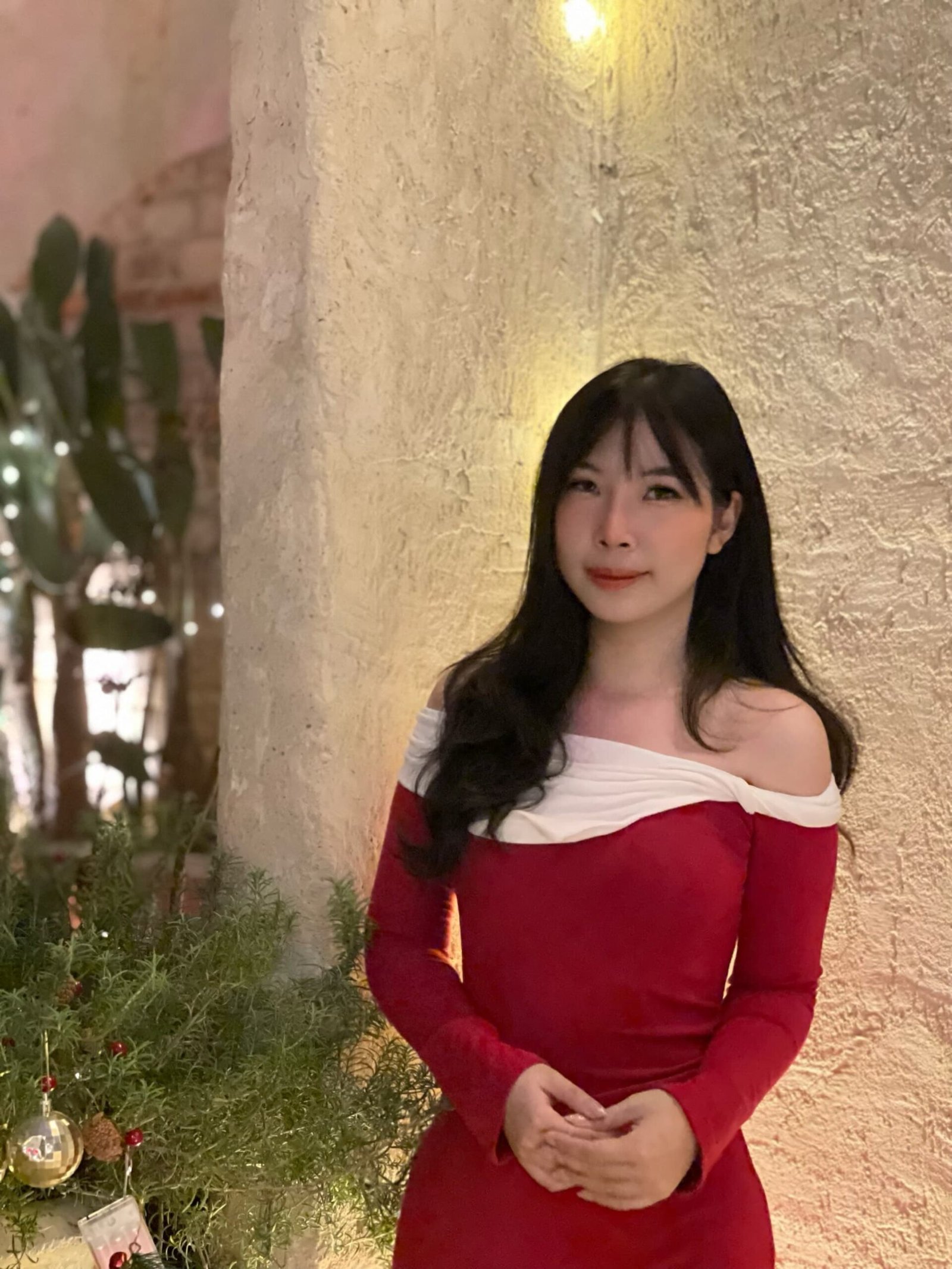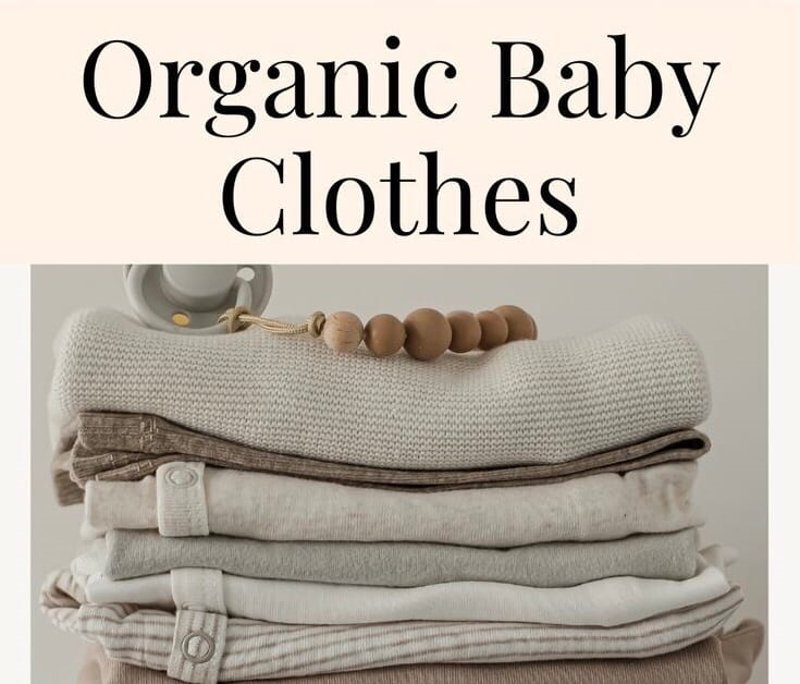
As a new mom, you spend hours researching the safest cribs, the most nutritious foods, and the gentlest skincare products. But have you considered the clothes your little one wears day in and day out? Your precious newborn, snuggled up in the organic baby clothes made from soft, chemical-free fabric. No harsh dyes or pesticides touching their delicate skin. Just pure, natural comfort. Sounds perfect, right?
With so many baby clothes options out there, it’s hard to know what’s truly best for your little one and the environment.
Don’t worry, mama. I’ve been there, and I’m here to help. As an environmental engineer and eco-conscious mom, I’ve done the research and made the switch to organic newborn clothes. Let me tell you, it’s been a game-changer. In this post, I’ll share why organic baby clothes are worth considering and how they can benefit both your baby and our planet.
What Is Organic Baby Clothing?
Organic baby clothing is made from the raw material segment like organic cotton, natural fibers that are grown and processed without using synthetic pesticides, herbicides, or chemicals fertilizers.
These clothes skip the harmful chemicals during production, making them gentler on your baby’s sensitive skin and kinder to the environment. They’re designed specifically for little ones, so you can feel good knowing your baby is wearing something safe and natural. The GOTS certified is the leading certification in this country, requiring at least 70% natural organic fibers for the “made with organic” label and 95% for the full organic label.
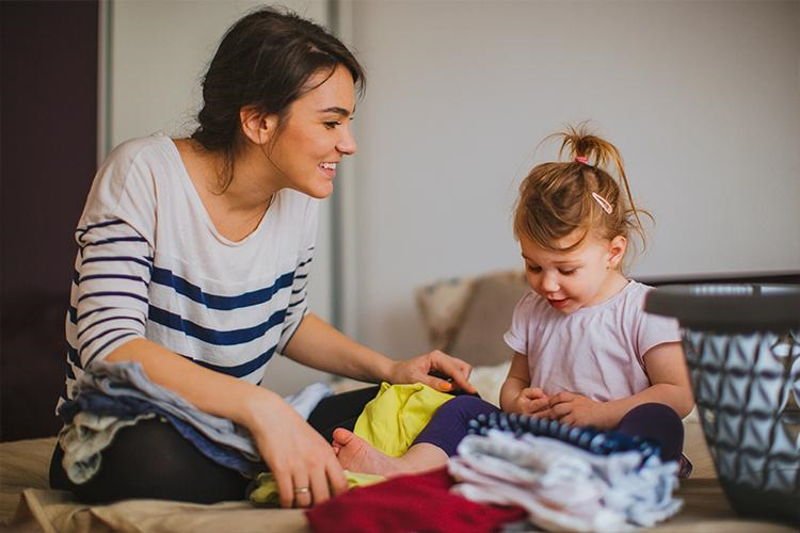
What’s The Big Deal About Organic Baby Clothes?
When I first learned about organic baby clothes, I was skeptical. Was it just another trendy, overpriced option? But as I dug deeper, I realized the benefits were real and significant.
1. Protects your baby’s skin naturally
Soft baby clothes is known for its superior softness, providing gentle comfort for delicate baby skin. Plus, without the harsh chemicals used in traditional farming and production, organic cotton baby clothes are less likely to cause skin irritations, rashes or allergies.
The fabric is also breathable, allowing air to circulate freely, which helps to keep your baby’s skin dry and comfortable throughout the day. This means fewer concerns about chafing or irritation, even after hours of wear.
2. Helps in cooling the skin
One of the wonderful qualities of organic cotton is its natural ability to regulate temperature. This makes it an ideal choice for babies, who are more sensitive to changes in temperature.
In warm weather, organic cotton’s breathable fabric allows heat to escape, keeping your baby cool and reducing the risk of overheating. Conversely, in cooler temperatures, the fabric provides just enough warmth to keep your baby cozy without causing them to sweat.
This natural temperature regulation helps maintain your baby’s comfort, whether they’re playing during the day or sleeping at night, ensuring they stay comfortable no matter the season.
3. Long-lasting durability
Organic clothing for kids tends to last longer due to the high-quality fabric that withstands multiple washes. Clothes that last longer can be passed down to younger siblings or friends, reducing the need for constant repurchasing and extending the life of each garment. This longevity not only saves money in the long run but also reduces waste, making it a win for both your wallet and the environment.
4. Eco-friendly choice
Organic farming practices promote healthier soil, water conservation, and reduced pollution, making it a more sustainable option for the environment. Organic farming methods generally require less energy and produce fewer greenhouse gas emissions, contributing to a healthier planet.
As a mom who’s always thinking about my baby’s health, switching to organic cotton onesies gave me peace of mind. It’s one less thing to worry about in the constant juggling act of parenthood!
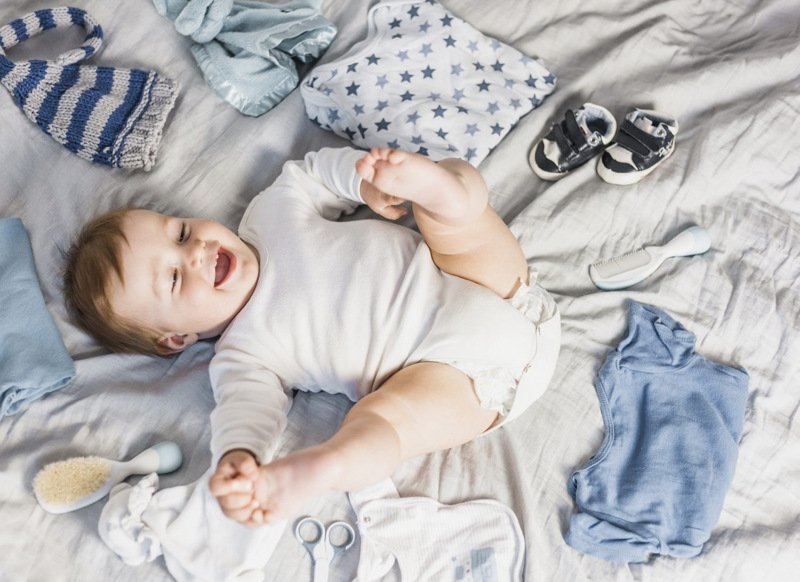
Earth-Friendly Fashion: How Organic Baby Onesies Help the Planet
Now, let’s talk about my favorite topic – sustainability! As an environmental engineer, I’m always looking for ways to reduce our impact on the planet. Organic baby clothes are a fantastic way to do just that.
Here’s how organic baby clothes and conventional benefit the environment
| Aspect | Organic Clothes | Conventional Clothes |
| Farming Practices | Grown without synthetic pesticides, herbicides, or fertilizers. Utilizes natural methods like crop rotation, composting, and biological pest control to maintain soil health. | Relies heavily on synthetic pesticides and fertilizers, which can degrade soil quality and harm wildlife. |
| Water Usage | Uses significantly less water, often relying on rain-fed irrigation. | Requires large amounts of water, leading to depletion of local water supplies and inefficient irrigation. |
| Chemical Pollution | Free from toxic chemicals, preventing harmful runoff into rivers and lakes. | Synthetic chemicals lead to runoff that can pollute water sources and harm aquatic ecosystems. |
| Soil Health | Promotes healthier soil through natural practices, making soil more resilient and supportive of biodiversity. | Continuous use of chemical fertilizers and monoculture practices degrade soil health over time. |
| Carbon Footprint | Lower carbon footprint due to reduced energy use and fewer greenhouse gas emissions. | Higher greenhouse gas emissions due to energy-intensive production of synthetic chemicals and machinery use. |
By choosing organic baby clothes, we’re not just caring for our little ones – we’re investing in a healthier planet for their future.
Where To Shop: Top Brands For Organic Baby Clothes
Despite the obvious health and environmental benefits, most parents are unlikely to switch to organic baby apparel. First and foremost, purchasing for a newborn can be perplexing, if not downright frustrating. Dozens of organic infant clothing items on the market provide an abundance of options. It is impossible for new and expectant parents to conduct comprehensive study and make sound decisions about everything.
Don’t worry, with my experience and environmental knowledge, I will assist you in reviewing the most trustworthy and best brands so that parents do not have to worry too much.
1. Burt’s Bees Baby
When I first held a Burt’s Bees Baby onesie, I was amazed at how incredibly soft it felt because I think Burt’s Bees is just good for lip balm and natural face wash. Their organic cotton baby clothes have become a staple in my baby’s wardrobe. I especially love their zip-up footie pajamas, they make those middle-of-the-night diaper changes so much easier! The neutral colors and simple designs go with everything, which is great for mixing and matching. Plus, they hold up really well in the wash, maintaining their softness even after multiple cycles.
What sets Burt’s Bees Baby apart is their commitment to both sustainability and safety. Their baby clothes are crafted from GOTS-certified organic cotton, ensuring they are free from harmful chemicals and produced with care for the environment. Additionally, many of their products meet the rigorous standards of OEKO-TEX® Standard 100, a globally recognized certification that guarantees textiles are tested for harmful substances, making them completely safe for your little one’s sensitive skin. The brand also prioritizes eco-friendly manufacturing practices, including renewable energy use and water conservation initiatives. Even their packaging reflects their dedication to sustainability, as they strive to use recyclable, reusable, or compostable materials. Choosing Burt’s Bees Baby means not only providing the best for your baby but also supporting a healthier, more sustainable planet.
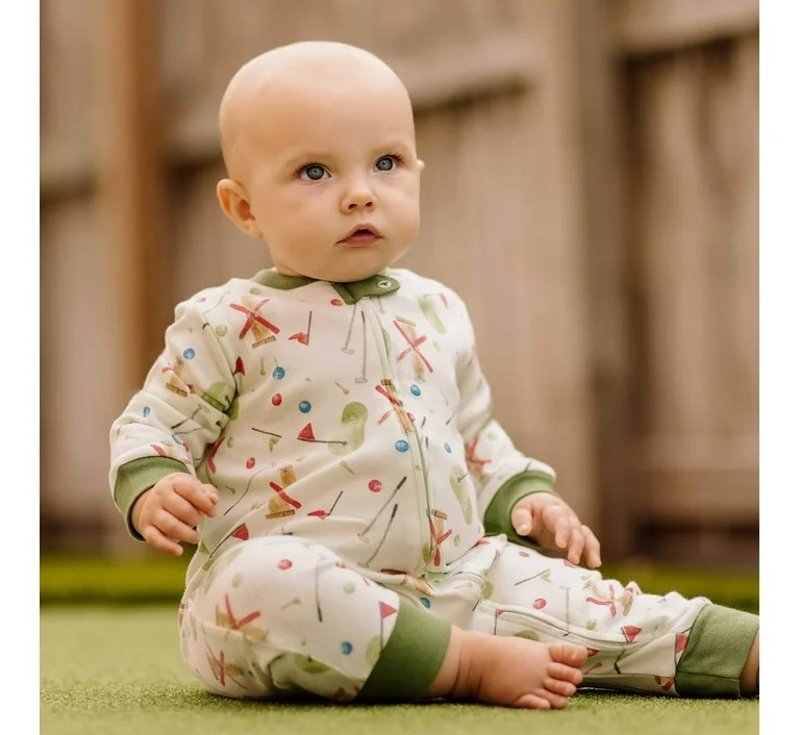
2. Hanna Andersson
Yes, Hanna Andersson is on the pricier side, but let me tell you—these clothes are worth every penny. When my little one was born, I purchased a set of their organic cotton pajamas, and they have held up remarkably well through countless washes, spit-ups, and even a few accidental bleach spills! The colors remain vibrant, the material doesn’t pill or wear thin, and the quality is evident with every use. Their seasonal designs are an absolute delight—the Halloween and Christmas prints are just too adorable to pass up, adding a touch of festive charm to our family traditions.
What truly sets Hanna Andersson apart is their commitment to sustainability and quality. They use 100% certified organic cotton, ensuring the clothing is free from harmful chemicals, and OEKO-TEX Standard 100 certification guarantees that the fabrics are safe, breathable, and comfortable for sensitive skin. Their focus on durability and design means these pieces are not only eco-friendly but also practical investments that stand the test of time. For parents willing to invest in premium, sustainable pieces, Hanna Andersson offers a blend of style, comfort, and peace of mind that’s hard to beat.
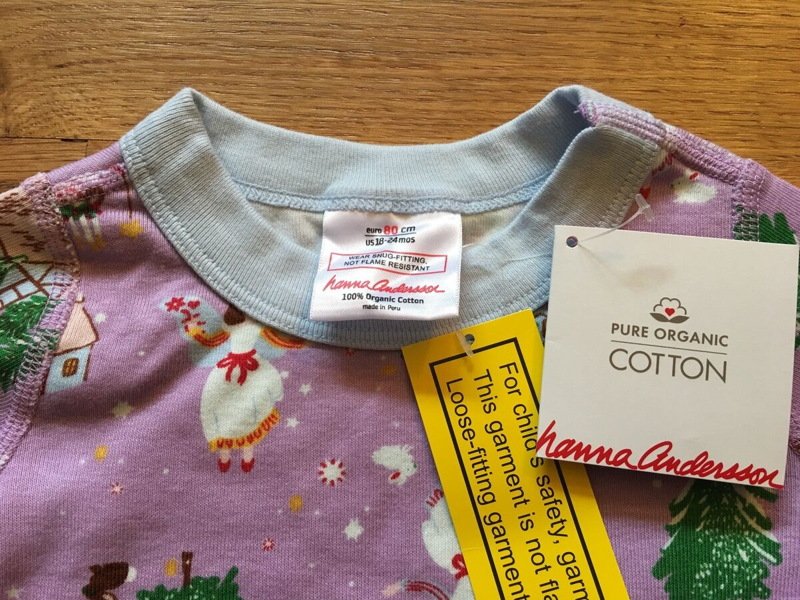
3. Under The Nile
Under The Nile’s 100% organic Egyptian cotton is truly exceptional. Their products are crafted in Egypt using the finest organic cotton, certified by the Global Organic Textile Standard (GOTS) and the USDA National Organic Program (NOP). These certifications guarantee that their cotton is grown without synthetic fertilizers, pesticides, or genetic engineering, and that their production processes meet rigorous environmental and ethical standards. The result is an incredibly soft fabric that’s safe, sustainable, and perfect for my baby’s sensitive skin.
I particularly love their swaddle blankets. They are lightweight yet warm, making them versatile for all seasons, and they get even softer with every wash. The quality and durability are unmatched, ensuring they’ll last through countless uses. Their fruit and veggie toys are another standout in our home. Not only are they made from the same high-quality organic cotton, but they’re also certified safe by OEKO-TEX Standard 100, giving me peace of mind while my baby plays. These toys have become a fun and creative way to introduce healthy eating habits, sparking curiosity and delight in my little one.
What makes Under The Nile even more special is their deep commitment to sustainability and ethical practices. Through the USDA NOP certification, their farming practices prioritize soil and water conservation, while avoiding harmful chemicals. Their cotton is grown as part of their 13 Villages Project, which supports local Egyptian farmers and fosters sustainable agriculture. By choosing their products, I know I’m supporting a company that values the environment, fair trade, and the well-being of its workers. It’s a decision that feels good for both my baby and the planet.
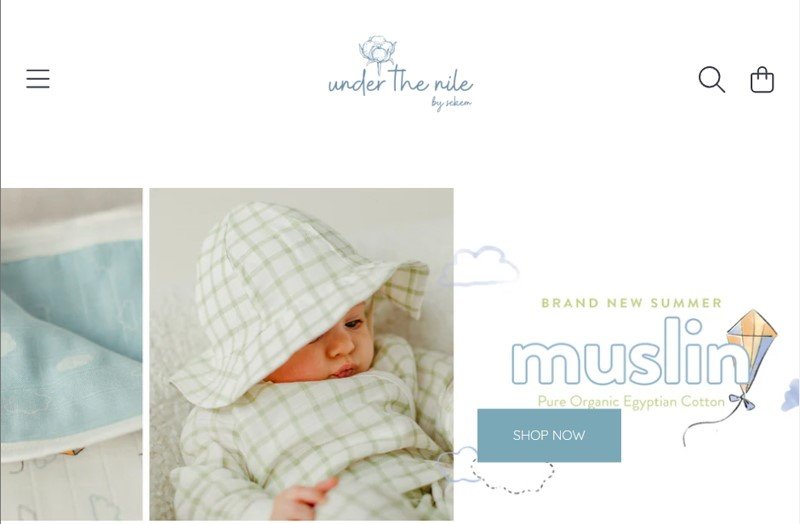
4. Tenth & Pine
As someone who isn’t a fan of overly gendered baby clothes, I instantly fell in love with Tenth & Pine’s stylish, gender-neutral options. Their organic bamboo fabric is a standout feature—not only is it sustainably sourced, but it’s also incredibly soft and breathable, making it perfect for my baby’s delicate skin. I’m especially fond of their kimono-style bodysuits; they’re not only adorable but also incredibly practical, making diaper changes and dressing a breeze.
The muted, earthy color palette is another highlight. These tones pair effortlessly with everything and exude a modern, minimalist vibe that I adore. While Tenth & Pine clothing is a bit more expensive, the quality justifies the price. The durable fabrics hold up well and transition beautifully between siblings, regardless of gender, making them a worthwhile investment.
What makes Tenth & Pine even more impressive is their dedication to sustainability and safety, backed by reputable certifications. Their organic cotton products are certified by the Global Organic Textile Standard (GOTS), ensuring they meet strict environmental and social criteria throughout the supply chain. Additionally, their bamboo viscose fabrics are OEKO-TEX® Standard 100 certified, meaning they’ve been tested for harmful substances and are completely safe for little ones.
One thing to note is that bamboo fabric tends to shrink a bit more than cotton. To maintain the fit and prolong the life of these lovely pieces, I always wash them in cold water and air dry them. With their focus on sustainability, comfort, and timeless style, Tenth & Pine has truly become a favorite for our family, offering peace of mind and exceptional quality with every purchase.
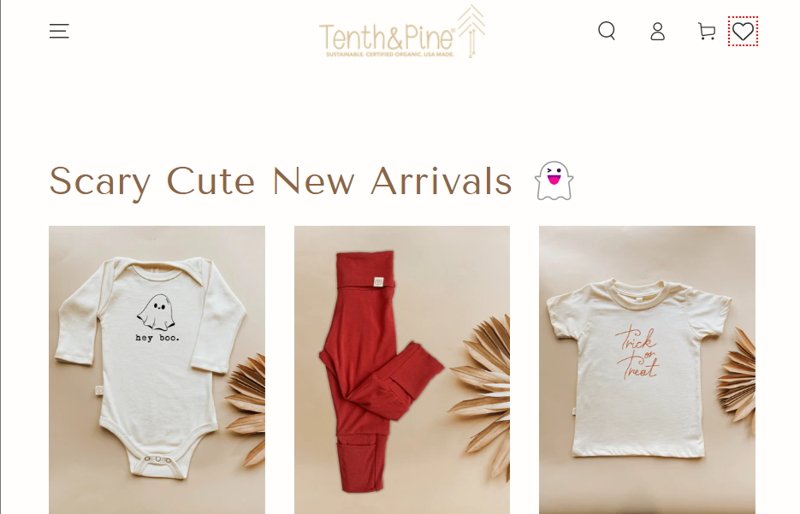
Remember, you don’t have to overhaul your baby’s entire wardrobe overnight. Start with a few key pieces and gradually build up your organic collection as your budget allows.
Caring For Organic Baby Clothes: Tips To Make Them Last
Taking care of organic baby clothes is essential to ensure their longevity and maintain their softness and quality. Here are some practical tips:
- Wash in cold water: It’s gentler on the fabrics and saves energy.
- Use non toxic laundry detergents: Choose detergents free from harsh chemicals, synthetic fragrances and dyes that can irritate your baby’s sensitive skin.
- Air drying: Whenever possible, air dry organic baby clothes. This method is gentler on the fabric and reduces the wear and tear caused by tumble dryers.
- Treat stains promptly: A simple mixture of baking soda and water works wonders on most baby stains.
- Store properly: Keep clothes in a cool, dry place to prevent mildew or etc.
By taking good care of your organic infant clothing, you’re not only extending their life but also maximizing the environmental benefits of your choice.
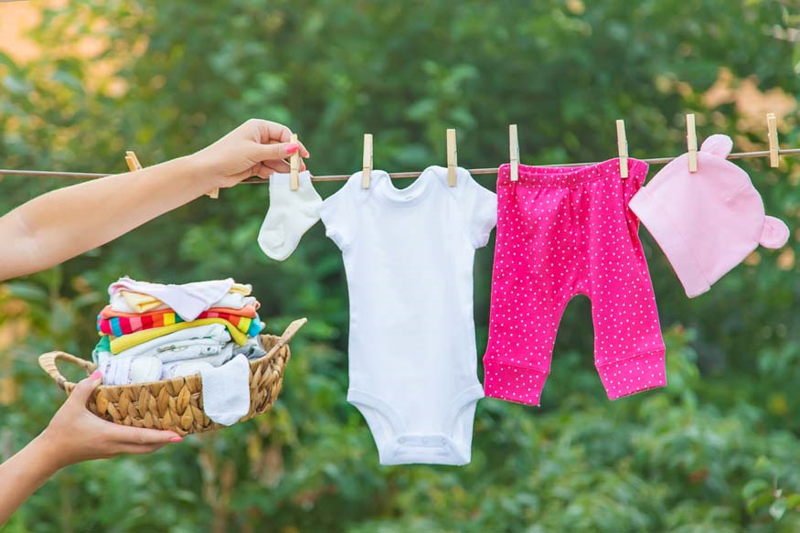
Conclusion
Investing in organic baby clothes is a choice that benefits not only your baby but also the planet. These garments, made from the purest materials, offer unmatched comfort and safety for your little one while supporting sustainable farming practices.
Have you made the switch to organic baby bibs or other organic baby items? What has your experience been like? Share your thoughts or ask any questions in the comments below.
